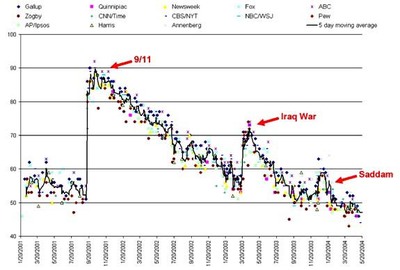Nick Confessore at Tapped as an excellent post on the subject of "Reagan’s Other Legacy". In it, he refers to an article by New Republic contributor Jonathan Chait (posted at the Reagan legacy website). The Chait article is prescient, being dated before 9/11 — indeed, being dated before George W. Bush was "elected". He summarizes the Reagan mystique in this way:
The Reagan presidency lives on in conservative mythology as a bygone utopia peopled by titans against whom the mortals of today must be measured. As conservative writer David Frum observed in his 1994 lament, Dead Right, "Post-Bush conservatives look back on the accomplishments of the early Reagan years the way seventh-century Romans must have looked at their aqueducts: to think that we once built all this!" When conservatives debate the Reagan legacy, it is not to dispute its merits but to lay competing claims to its mantle. Witness this year’s intraconservative debate over expanding trade with China. Proponents of permanent normal trading relations pointed to Reagan’s support for free trade; opponents invoked his anti-communism. Had someone dug up a forgotten diary entry laying out Reagan’s position for such a future contingency, it might have settled the argument then and there. The premise underlying such debates was explicated by Reagan hagiographer Dinesh D’Souza, who wrote that "the right simply needs to approach public policy questions by asking: What would Reagan have done?"
And therein lies the problem. Once it is agreed that all wisdom resides in the canon of Reagan, then the hard work of debate and self-examination and incorporating new facts is no longer necessary. On economics, defense, and morality, the Republican Party has refused to adapt itself to a patently changed political landscape for fear of acknowledging that the old ideas–the Reagan ideas–no longer work. And those who have tried to adapt have been cast out as heretics–anti-Reagan and therefore anti-conservative or even anti-Republican. When Ronald Reagan was actually president, Republicans prided themselves on being "the party of ideas." Now, as their hero fades into the twilight, his memory sits at the heart of a deep intellectual ossification.
And then predicts what this would mean for the younger Bush:
The mortals of the present can never live up to the icons of the past. In George W., the Reaganites appear to have everything they have always wanted: a popular conservative poised to end the political exile into which his father thrust them. But at some point W.’s ideology will smack up against the hard reality of today’s very different world, and either his popularity or his conservatism will give way. At that point the true believers will discover ideological deviations and conclude bitterly that the younger Bush is his father’s son after all. And then, the verity of their doctrine reaffirmed, they will begin once more their search for the true heir to Ronald Reagan.
This has proven to be true. Bush’s poll numbers have been in steady decline . . .
. . . but for three huge crises which have shot up his approval. As for that, Confessore has the right analysis:
These crises have obscured the inevitable clash between Bush’s ideology and his popularity, and of course Bush has also tried hard to camoflage many of his most purely conservative proposals in a way Reagan never bothered to.
Indeed. Even for conservatives, Bush (like his father) isn’t Reagan.

